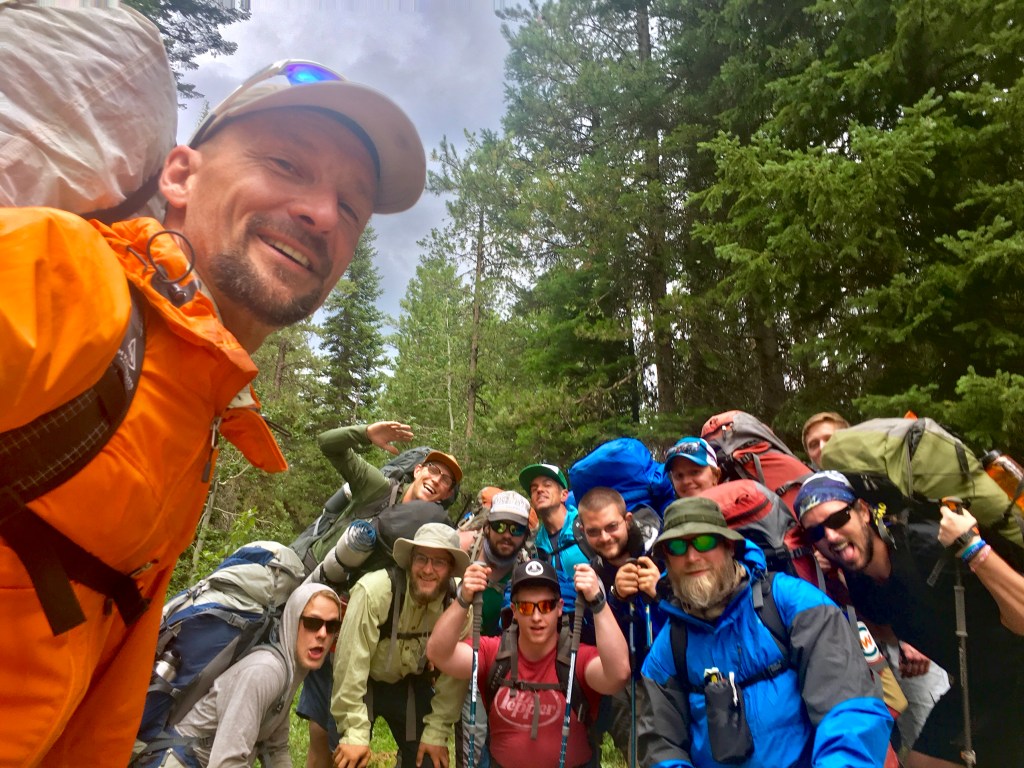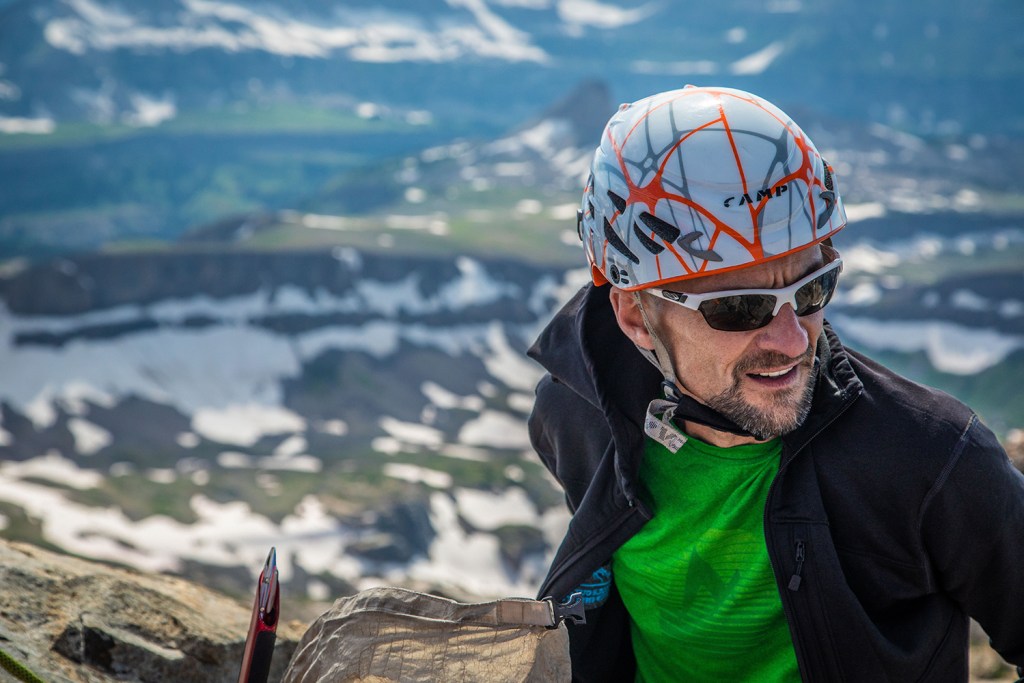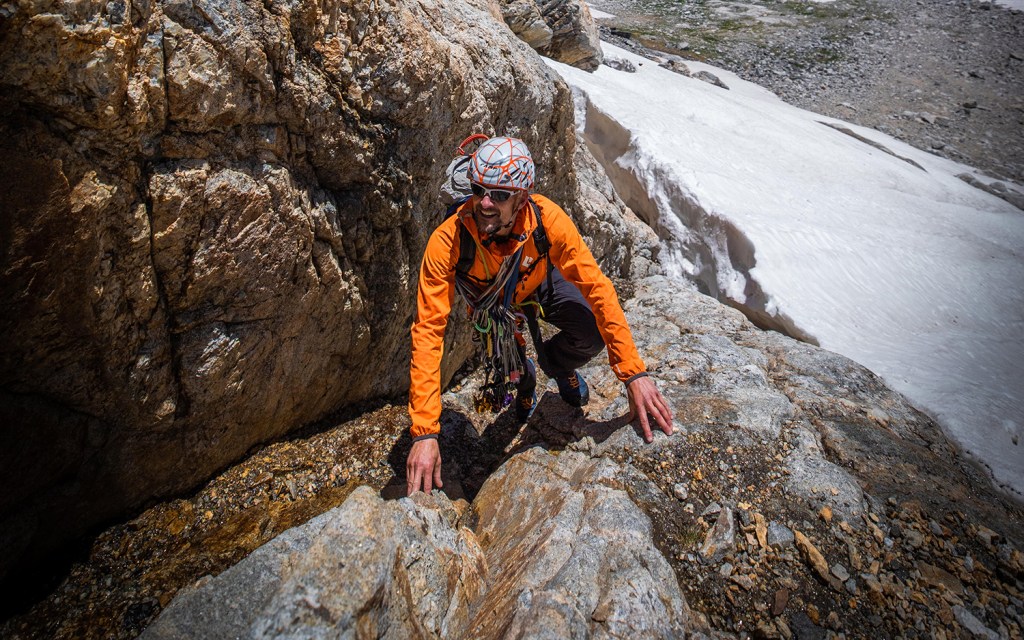Jacob Urban’s depression started after the helicopter crash. It was February 15, 2012, and a helicopter carrying rescue workers from Wyoming’s Teton County Search and Rescue to aid an injured snowmobiler went down in the Tetons. The pilot and two rescuers were badly injured. Urban was among the additional volunteers from Teton County Search and Rescue dispatched to the crash, but due to incorrect coordinates, the helicopter and his crew couldn’t locate the downed one. They flew around fruitlessly and eventually had to stop to refuel. While they were refueling at the airport, they got word that Ray Shriver, a founding member of Teton County Search and Rescue, had died at the scene of the crash.
“The impact on our team was crushing,” Urban said. “It affected everyone. That tragedy impacted our team holistically. It changed everything about how we operate.”
It also changed Urban himself. He grew depressed, started having trouble sleeping and couldn’t stop asking himself the same question: Would Ray have survived had we been able to find the scene quicker? “I was trying to deal with it all myself. But I didn’t actually fix anything,” he said. “On rescues, that was the one place I felt like myself, because that is where I had a higher purpose.”
Although they were the source of much of his personal pain, the rescues themselves created a temporary diversion. “I’d go on a rescue and be so amped. That’s when I did my best job. But in my own mind, I was not happy,” Urban said. “The rescue work was a distraction, but the work would cause even more trauma.”
In the spring of 2015, Urban responded to a backcountry avalanche on Mount Moran, located in Grand Teton National Park, where one skier had been killed and another seriously injured (they evacuated the wounded skier, but he later died of his injuries). Urban had plans to ski that same mountain later in the day and the four skiers involved in the slide were well-respected locals who Urban knew. The incident hit him hard. More trouble sleeping, more preoccupation with rescues. That summer, he found himself out in the mountains, rock climbing by himself, taking unnecessary risks. “I was taking risks that weren’t right. I was trying to prove to myself that I could take risks in the outdoors and still live,” he said.
Eventually, the pressure got so intense, he snapped, lashing out at his search and rescue teammates in one particularly volatile outburst. In February 2017, Teton County Search and Rescue issued Urban a disciplinary notice for his behavior. “I was pretty much constantly crying unless I was on a rescue,” Urban said. “I was unable to take care of myself, let alone lead a team.”
Urban didn’t realize it at the time, but around a year later, in spring 2018, he was diagnosed with long-term depression and post-traumatic stress disorder (PTSD), a condition well-known among veterans but less associated with rescue workers. The U.S. Department of Veterans Affairs estimates that up to 34 percent of rescue workers and first responders experience PTSD and between 21 and 53 percent suffer from depression. So Urban wasn’t alone. But that’s exactly how he felt.

Urban with his trainees at the Jackson Hole Outdoor Leadership Institute. (Photo Courtesy of Jacob Urban)
Urban worked as a ski patroller and outdoor education teacher at Lyndon State College in Vermont before moving to Jackson, Wyoming, in 2006, for a change of lifestyle. He couldn’t find a teaching job in Jackson, so he tuned skis and carried golf bags. He eventually started teaching undergraduate wilderness courses for Central Wyoming College and by 2009, he and his then-wife launched the Jackson Hole Outdoor Leadership Institute, now one of the premier wilderness education schools in the country, focusing on avalanche education and wilderness first aid.
He joined Teton County Search and Rescue, a volunteer organization that works with the Teton County Sheriff’s Office to respond to backcountry emergencies in a vast section of the southern Teton range, roughly the size of Delaware. Urban quickly became one of the organization’s most trusted and hard-working volunteers. He was on nearly every serious rescue, started leading trainings for other volunteers and became deputy director of the organization.
“Jake was a great rescuer. He could get there, he knew how to use the equipment, he had the skills, the fitness, the intensity,” said Cody Lockhart, chief advisor of Teton County Search and Rescue and a longtime peer of Urban’s. “When a rescue was happening, Jake was able to lock in on it and solve the problem.”
For many emergency workers, the task of saving someone can feel empowering and rewarding—especially when the outcome is good; but even then, there’s the let-down afterward. “You’re in these frantic, adrenaline-filled moments. You’re hooked on it,” said Lockhart. “But then you have to come off of it. Everything else turns some version of grey compared to those euphoric moments of rescuing someone.”
When an operation isn’t successful, the aftermath can feel devastating. Lockhart says he has felt anxiety after a rescue, too, but he has a support system of family and friends to help him process it. Urban, who separated from his wife in 2017, didn’t have that. “Everyone who does emergency work is one trauma away from depression, away from PTSD, away from the bottom,” Urban said. “What I mean by that is if you perceive that your support system doesn’t exist, everything around you falls apart.”
Plus, as Urban and Lockhart both say, the people they’re saving are sometimes individuals they know personally, friends out there doing activities—skiing, climbing—of which the rescuers themselves are avid participants. “You dig enough dead people out of avalanches and then when you go backcountry skiing, you’re not thinking of face shots and blower powder. You think, ‘Am I going to die?’” Lockhart said. “You carry that around with you. What used to be your happy place all of a sudden has this really ugly side.”

Urban, a longtime search and rescue volunteer, was diagnosed with post-traumatic stress disorder last year. (Photo Credit: Dirk Collins)
Unlike professional rescuers—say, firefighters or EMTs—most search and rescue crews rely primarily on volunteers. They’re often women and men who hold other jobs and intermittently get called in to help a climber who’s fallen off a cliff in the middle of nowhere. They receive rescue skills training and are armed with the latest equipment, but it wasn’t until recently that search and rescue organizations around the country say they began offering varying levels of mental health support for their volunteers.
Most search and rescue organizations are nonprofits funded by donations, so budgeting constraints often haven’t allowed for expenses like an on-call therapist. But nowadays, due to an increasing focus on mental health and some reorganized budgeting and fundraising specifically for mental health, many crews conduct something called a critical incident stress debriefing after a rescue, offering support ranging from anonymous help hotlines to access to a psychiatrist to peer-to-peer therapy.
It’s not just PTSD, either. At the International Commission on Alpine Rescue, or ICAR, a convention for professional and volunteer rescuers held in Chamonix, France, in mid-October, a workshop focused on the mental health of rescuers covered the various stress injuries that can occur—issues like anxiety, depression, substance abuse, strained social relationships, PTSD and suicidal thoughts. Those stresses, according to the conference, are more likely to occur when rescuers are overworked, resources and staffing are tight or the victims are people they know.
A longtime rescue professional and ski patroller from Aspen, Colorado, named Michael Ferrara, who was diagnosed with cumulative post-traumatic stress disorder from decades on the job, has made it his mission in recent years to educate fellow rescuers about the risks of not addressing mental health issues. He gives talks to first responder groups around the country. “One thing I tell first responders is that one of the most dangerous things you’ll face is the word hero,” Ferrara said. “Because how can you tell everyone how damaged you are when they think you’re a hero?”
Justin Hood, president of Mountain Rescue Aspen, the nonprofit search and rescue organization in Colorado’s Pitkin County, said they treat mental health issues as seriously as they do physical injuries sustained on the job. Mental health counselors from local agencies provide a range of services to their volunteers. “We’re trying to make it not taboo to talk about your feelings,” Hood said. “I see a psychologist once a month. I talk about it openly because I want people to feel comfortable seeking that kind of help.”
Wyoming’s Teton County Search and Rescue recently brought in a speaker named Tania Glenn, who specializes in first-responder PTSD. More than 400 people—ski patrollers, national park rangers, the sheriff’s office—showed up. About a year ago, the Teton County Search and Rescue Foundation started paying for mindfulness and meditation classes, began offering resilience tips at meetings, and set up a peer support network, all in an effort to provide preventative services and support networks to treat issues like PTSD.

“Are the pain and flashbacks still there? Yes. They’re just more tolerable now,” Urban said. (Photo Credit: Dirk Collins)
“What we’re dealing with is a culture where mental health is not really talked about,” said Stephanie Thomas, executive director of the Teton County Search and Rescue Foundation. “Cowboy culture has always been that after a bad call, you go to the bar and deal with it. Our team, foundation and volunteers are dedicated to teaching people how to reenter the real world after being in crisis mode. Together, we have to train them for that and give them tools to handle it.”
Exactly one year ago, in October 2017, Urban quit search and rescue work for good. He knew he couldn’t recover while continuing to see traumas in the mountains. After his last rescue, he felt immense relief. “It was as if there was a weight off my back. Like, ‘OK, the ghost has left,’” said Urban, who’s now 48. He still owns and serves as the lead teacher at Jackson Hole Outdoor Leadership Institute but, he says, teaching causes fewer triggers. “Are the pain and flashbacks still there? Yes. They’re just more tolerable now,” he said.
He’s since undergone extensive therapy and now relies heavily on journaling, diet and exercise to keep him stable. He quit drinking and has started running every day. “I’m not supposed to solve my life’s problems by saving other people,” he said. “I’m just trying to be a happy individual who’s good to people, who doesn’t owe anyone anything other than what I owe myself.” He’s learned to find highs not from saving people’s lives, but from living his own.


